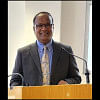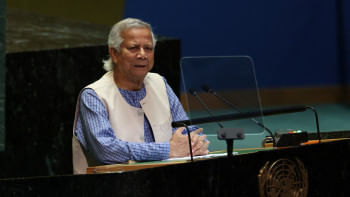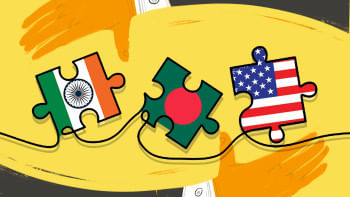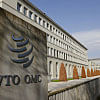Exploring BRICS and global governance

We fought two world wars because of economic nationalism, the driving force behind the warring powers. The Bretton Woods Conference (1944) attempted to counter that by establishing an exchange rate and monetary system for trade and investment under the surveillance of the International Monetary Fund (IMF). It also established the World Bank (former International Bank for Reconstruction and Development) to recover from the scourge of war and tender a platform for equitable global development. Later, the United Nations and World Trade Organization (former General Agreement on Tariffs and Trade) joined the global arrangement for peace, economic growth, and trade.
These institutions have established a world order incorporating economic stability, relative peace, universal values, liberalisation, democratisation, and globalisation. Over the years, the order has benefited the West more than other nations in a systemic manner, increasing the income and wealth gap. Apparently, the West enjoys a monopoly in global governance. Its agenda is backed by a military alliance: NATO. It is likely to favour the status quo over change.
This leads us to BRICS (Brazil, Russia, India, China and South Africa), which has been around for 15 years. It represents 45 percent of the world population and 37 percent of the global GDP, while the West represents 10 percent of the world population and 28 percent of the global GDP.
BRICS has laudably opposed the monopolisation of power and rightfully noted that the world needs plurality, better governance, equitable development, and multilateral security. Their assessment concurs with the observation of the majority of the world, but has the organisation been able to offer realistic change in global governance? Specifically, has the organisation made the world a safer place to live or a better place to trade? How is it contributing to global economic development? Let's explore.
Since the late 1990s, the rise of the emerging markets has been phenomenal. Their economic growth rate was double that of the Western economy. The BRICS countries contributed to half of the global growth. The Western response to the rise of the emerging markets depended on how these countries affected the hegemony, as a group and individually. The West accommodated the group with a new platform: G20 in 1999. Individually, the initial five members of BRICS got different responses from the West. Brazil and South Africa are regional players and do not seriously affect the hegemony. This is also true for the new members. Another regional player, India, was drawn into the global platform for hegemonic interests.
With 143 million people, almost one-eighth of the global landmass, huge resources, veto membership, and nuclear capabilities, Russia stands as a strong power. However, the country also has an inherent economic weakness. It is highly dependent on exports of oil and gas (about 50 percent of Russia's total budget), basic minerals, and raw materials. The country lacks economic diversification and is also short on skilled manpower. Initially, to accommodate the Russian ascension, the West included the country in G7 in 1997. Following the annexation of Crimea in 2014, Russia was taken out of G7. In 2022, it invaded Ukraine. Now, the country faces political and economic sanctions and a complete ostracisation by the West. It is bogged in a war with no end in sight. The West believes that, given the structural weakness of the Russian economy and the shortage of manpower, their strategy will work, and in the long run may result in a regime change or disintegration. Despite all of these, Russia is officially recalibrating its geopolitical position as a Eurasian power, pursuing its united Russian World doctrine (Russkiy Mir).
Meanwhile, economic growth, a huge population base, skilled and disciplined labour force, party command structure, advanced technology, modernised military, and grandeur image have prepared China as a formidable power. Despite the trade dependency, it is the "rising power" that can truly challenge the US, the "established" power (Thucydides Trap). The West responded to China with a containment policy. They seem to have been quite successful in undermining China's Belt and Road Initiative (BRI), challenging its military capability (helped by Pacific nations and India), reducing its economic growth/expansion, and neutralising its diplomatic influence. China is busy managing its own economy and has less opportunity to attend to global affairs.
With regard to India, Modi's vision is of a technologically advanced country with a strong military grounded on Indian nationalism. It began modernising its military for regional as well as global pursuits. The West embraced India. In case they need to take a hardline position on China, India can fill the void by providing labour-intensive product/industry support. We observe an old China-India civilisation rivalry/competition. Seventy years ago, this is what Pandit Nehru avoided and joined hands with then Chinese Premier Zhou Enlai to advance the Non-Aligned Movement. So far, the Western strategy is working: India is a part of QUAD, supplying arms to Ukraine, and producing military products for Israel.
Let us now consider the role and performance of BRICS on global political, economic, and trade issues. On the political front, the wars in Ukraine and Palestine are still going on while war has started in Lebanon and Iran. Russia, host of the 2024 BRICS conference, which concluded in October, is directly engaged in Ukraine, and the US/West is strongly backing both Ukraine and Israel. The US support has given a competitive advantage to Israel in implementing its military goals, and China and Russia are not in a position to make any serious contribution to Middle East peace. The UN system has fallen behind in inclusivity, participation, and power-sharing. The veto system is an outdated postulation, incompatible with the current economic and political reality. Thus, BRICS shall have to do more to accommodate the Global South's voice.
Besides, the current financial system is governed by the IMF with a quota system that BRICS supports. IMF endorses an exchange rate system based on the US dollar. This has given global economic leadership to the US since the Bretton Woods. India does not support de-dollarisation. In Kazan, BRICS discussed the four components of the international monetary and financial system: payments, investments, reserves, and global financial safety. An alternative BRICS currency is not a reality at this time. The BRICS Pay, BRICS Clear, and BRICS Bridge are new initiatives. Some are partially functional. BRICS encourages the use of local currency in international transactions, but it is too early to evaluate these institutional arrangements. We will have to see how they evolve and mature.
Although BRICS has, over these years, evolved into an emerging markets club following G7 and G20, it is neither a trade bloc like the EU nor a military bloc like NATO. Evidently, the geopolitical, economic, and social agendas of the members are quite diverse and are not as unified as the EU or NATO. By ostracising Russia, containing China, embracing India, and keeping other members at bay, the West has limited the BRICS members' ability to take a unified stance.
No doubt, global governance needs reform. It can be addressed from within by the UN member countries where BRICS can play a significant role. It can also be an alternative platform to supplement plurality, security, and newer financial structures. So far, the organisation has distributed some funds to developing countries via the BRICS Development Bank. Its contribution to global peace is limited and its initiatives, in terms of trade and financial governance, are at an early stage. We will have to see how they survive the market test.
Under the current hegemonic condition, both China and Russia will continue to get hurt economically, politically, and socially. The situation may force them to enter a military alliance, which would definitely be a "game-changer" in the hegemonic relationship and global governance, but will face strong opposition from the West.
Dr Abu NM Waheeduzzaman is professor of marketing and international business at Texas A&M University-Corpus Christi.
Views expressed in this article are the author's own.
Follow The Daily Star Opinion on Facebook for the latest opinions, commentaries and analyses by experts and professionals. To contribute your article or letter to The Daily Star Opinion, see our guidelines for submission.

 For all latest news, follow The Daily Star's Google News channel.
For all latest news, follow The Daily Star's Google News channel. 











Comments